GST & Subsidies On Electric Vehicles in India

The government has provided direct incentives to increase demand. For a two-wheeler, for example, the 2019 Faster Adoption and Manufacturing of Hybrid and Electric Vehicles (FAME-II) plan offers Rs 15,000 per kWh of battery capacity (up to 40% of the vehicle cost) (scooter or bike). It's a direct incentive of Rs 10,000 per kWh of battery capacity up to Rs 1.5 lakh for electric four-wheelers.
Furthermore, the Centre offers a low GST rate of 5% on all EVs, which is significantly lower than the tax burden imposed on gasoline and diesel cars, and first-time individual buyers who take out a loan can get tax benefits of up to Rs 1.5 lakh under Section 80EEB of the Income Tax Act. The Ministry of Road Transport and Highways stated in August 2021 exempting electric cars from paying costs for registration certificate issuance or renewal.
These EV subsidies/incentives are in addition to those offered by state governments and are available nationwide.

Impact of Incentives on Electric Car TCOs
In the instance of a 160-kilometre-per-day electric taxi in Delhi, the payback may be reached in just 1.9 years compared to a diesel car, even with subsidies. When comparing a fuel taxi to a CNG taxi, the payback time is 2.8 years for a petrol taxi and just 2.6 years for a CNG taxi. With current EV market pricing, cost parity is impossible without incentives.
Similarly, when government incentives are offered, a private automobile must be driven for at least 75 kilometres per day over ten years to attain cost parity with ICE cars. Even with the daily use of 150 kilometres, cost parity cannot be attained without government incentives. As a result, incentives are critical in getting electric automobiles to cost parity with their internal combustion engine equivalents.

Subsidies in different states of India
Delhi
Consumers can get a subsidy of Rs 5,000 per kWh of battery capacity up to Rs 30,000 for two-wheelers, as well as registration and road tax exemption. Consumers who wish to buy a four-wheeler can get a subsidy of Rs 10,000 per kWh of battery capacity up to Rs 1.5 lakh, plus registration and road tax deductions. However, these incentives are only available to the first 1,000 electric automobiles registered in the state.
Telangana
Telangana state cabinet passed an EV policy on the 5th August, 2020. The following are the main characteristics of this governmental policy:
- For first 2 lacs,the 2-wheelers, five thousand4-wheelers, and the twenty thousand3-wheeler auto-rickshaws, there is a 100 percent exemption on road tax and registration expenses.
- The 1stfive hundredbattery charging and exchange stations will get a 25% capital subsidy on charging equipment.
- The public EV charging station has granted a ten-year duty exemption on electricity tariffs.
- Private electric car charging station providers and along with fast-charging battery equipment will be reimbursed up to 75%.
The state of Telangana has set aside 775 acres and 1,425 crores for the development along with establishment of electric vehicle manufacturing plants. EV sales are expected to climb by 23% by 2020, with around six thousand4-wheeler EV vehicles and six thousand two-wheeler EV cars conducting daily journeys and providing benefits to the environment.

Maharashtra
Road tax and registration fees are waived for all-electric vehicles in the state. The first 1 lakh electric two-wheeler customers in this state are eligible for a Rs 5,000 per kWh battery capacity incentive, with a ceiling of Rs 10,000. If the two-wheeler is purchased before December 31, 2021, the state will grant an early bird bonus of up to Rs 15,000 (with a 3 kWh battery). A scrappage incentive of Rs 7,000 is also available.
Gujarat
For the first 1.1 lakh electric two-wheelers, users can get a subsidy of Rs 10,000 per kWh of battery capacity up to Rs 20,000. Consumers can also get a road tax and registration exemption. Meanwhile, the first 10,000 auto purchasers would receive a rebate of Rs 10,000 per kWh of battery capacity up to Rs 1.5 lakh. This is in addition to registration and road tax exemptions.
Latest News
 Jaiveer Mehra | Feb 16, 2026Nissan Gravite India Debut Tomorrow: What To ExpectThe Gravite is Nissan’s entry into the subcompact MPV segment and shares its underpinnings with the Renault Triber.1 min read
Jaiveer Mehra | Feb 16, 2026Nissan Gravite India Debut Tomorrow: What To ExpectThe Gravite is Nissan’s entry into the subcompact MPV segment and shares its underpinnings with the Renault Triber.1 min read Jaiveer Mehra | Feb 16, 2026Mobileye To Deploy Hands-Off ADAS Tech In India In 2027The company is also eyeing localising its ADAS systems in India as it expects demand to rise with changes in regulations.1 min read
Jaiveer Mehra | Feb 16, 2026Mobileye To Deploy Hands-Off ADAS Tech In India In 2027The company is also eyeing localising its ADAS systems in India as it expects demand to rise with changes in regulations.1 min read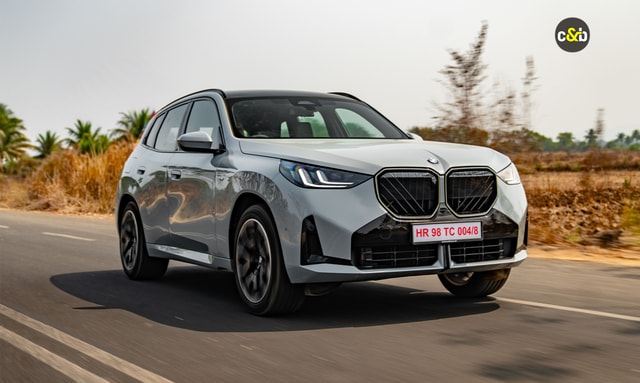 Bilal Firfiray | Feb 16, 2026BMW X3 xDrive30 M Sport Pro Lanched In India At Rs 74.50 LakhThe new range-topping xDrive 30 done up in the M Sport Pro trim offers 255bhp and 400Nm. Can do 0-100kmph in just 6.3 seconds1 min read
Bilal Firfiray | Feb 16, 2026BMW X3 xDrive30 M Sport Pro Lanched In India At Rs 74.50 LakhThe new range-topping xDrive 30 done up in the M Sport Pro trim offers 255bhp and 400Nm. Can do 0-100kmph in just 6.3 seconds1 min read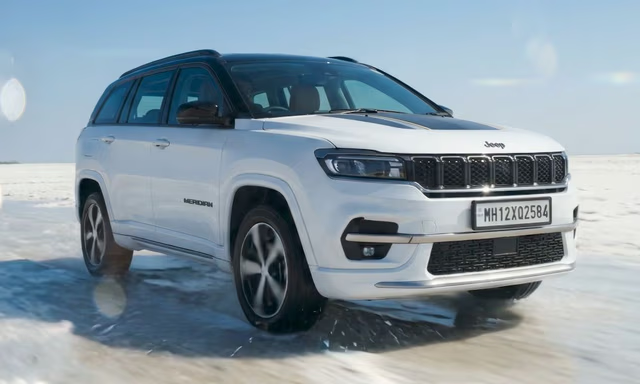 Jaiveer Mehra | Feb 16, 2026Jeep Meridian Track Edition Launched In India; Prices Start At Rs 35.95 LakhSpecial edition of the Meridian is based on the fully-loaded Meridian Overland.1 min read
Jaiveer Mehra | Feb 16, 2026Jeep Meridian Track Edition Launched In India; Prices Start At Rs 35.95 LakhSpecial edition of the Meridian is based on the fully-loaded Meridian Overland.1 min read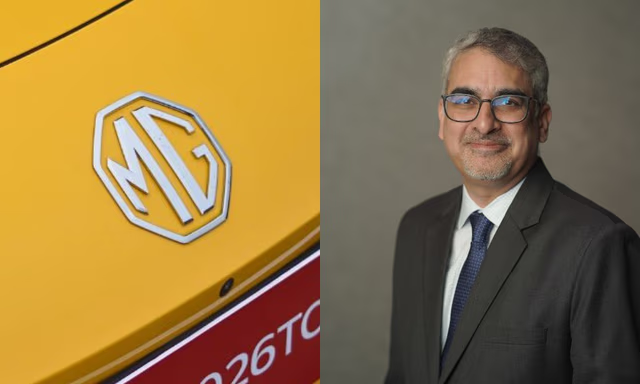 Girish Karkera | Feb 16, 2026MG's First Plug-In Hybrid For India Coming In 2026, Confirms MD Anurag MehrotraJSW MG is pivoting toward a hybrid and electric future, targeting a 30% market share for New Energy Vehicles (NEVs) by the end of the decade1 min read
Girish Karkera | Feb 16, 2026MG's First Plug-In Hybrid For India Coming In 2026, Confirms MD Anurag MehrotraJSW MG is pivoting toward a hybrid and electric future, targeting a 30% market share for New Energy Vehicles (NEVs) by the end of the decade1 min read car&bike Team | Feb 15, 2026Maruti Suzuki Brezza Facelift Spied With 6-Speed Manual GearboxLatest images of the test car’s interior suggest that it could become the first Maruti to get a 6-speed manual gearbox.1 min read
car&bike Team | Feb 15, 2026Maruti Suzuki Brezza Facelift Spied With 6-Speed Manual GearboxLatest images of the test car’s interior suggest that it could become the first Maruti to get a 6-speed manual gearbox.1 min read
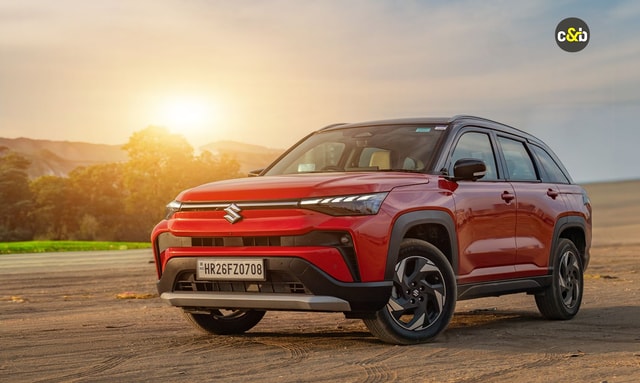 Jafar Rizvi | Feb 15, 2026Maruti Suzuki Victoris: Long-Term Review - Report 1The Victoris is Maruti’s latest offering for the Indian market, and after spending some time with it, here are a few early impressions.1 min read
Jafar Rizvi | Feb 15, 2026Maruti Suzuki Victoris: Long-Term Review - Report 1The Victoris is Maruti’s latest offering for the Indian market, and after spending some time with it, here are a few early impressions.1 min read Bilal Firfiray | Feb 12, 2026BMW X3 30 xDrive M Sport Review: The Driver’s SUV ReturnsRange-toppingX3 30 xDrive M Sport brings back the fun with 255bhp and genuine enthusiast appeal. Does this performance-focused SUV stand out?5 mins read
Bilal Firfiray | Feb 12, 2026BMW X3 30 xDrive M Sport Review: The Driver’s SUV ReturnsRange-toppingX3 30 xDrive M Sport brings back the fun with 255bhp and genuine enthusiast appeal. Does this performance-focused SUV stand out?5 mins read Bilal Firfiray | Feb 11, 2026Mercedes-AMG CLE 53 Coupe Review: The Goldilocks AMG?The Mercedes-AMG CLE 53 Coupe is a concoction of hooliganistic performance and everyday usability. Here’s why this Rs 1.5 crore two-door AMG might be the perfect modern sports coupe for India.6 mins read
Bilal Firfiray | Feb 11, 2026Mercedes-AMG CLE 53 Coupe Review: The Goldilocks AMG?The Mercedes-AMG CLE 53 Coupe is a concoction of hooliganistic performance and everyday usability. Here’s why this Rs 1.5 crore two-door AMG might be the perfect modern sports coupe for India.6 mins read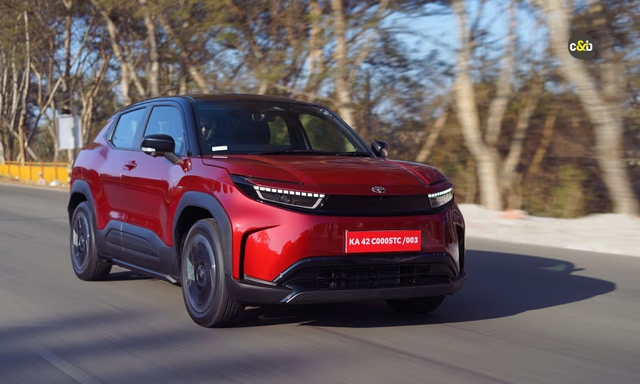 Girish Karkera | Feb 11, 2026Toyota Ebella EV Review: Compact And Fun-To-Drive With The Promise Of Stress-Free AftersalesNo hiding the fact that it is a clone of the Maruti Suzuki eVitara, but the first all-electric Toyota in India is reasonably well-rounded8 mins read
Girish Karkera | Feb 11, 2026Toyota Ebella EV Review: Compact And Fun-To-Drive With The Promise Of Stress-Free AftersalesNo hiding the fact that it is a clone of the Maruti Suzuki eVitara, but the first all-electric Toyota in India is reasonably well-rounded8 mins read Bilal Firfiray | Feb 10, 2026Tata Punch EV Long Term Review: Small EV With A Big-Hearted PersonalityWith the new Punch EV Facelift just around the corner, we decided to take a look at what it excels at and what could be improved.7 mins read
Bilal Firfiray | Feb 10, 2026Tata Punch EV Long Term Review: Small EV With A Big-Hearted PersonalityWith the new Punch EV Facelift just around the corner, we decided to take a look at what it excels at and what could be improved.7 mins read




























































































































